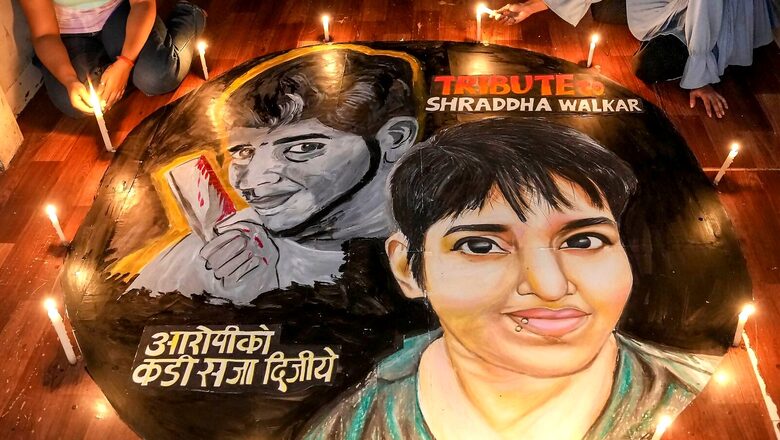
views
The spine-chilling murder of Shraddha Walker allegedly by Aaftab Poonawala in Delhi has sent shock waves across the country and raised a million questions in the minds of families about the safety of their daughters. The discourse following the murder is largely revolving around the gory details, speculative reasons for the crime and the mysterious mind of the criminal. The need of the hour is to help families and the young adapt to the new world and learn new technologies to prevent violence and mayhem against women. Following are some strategies:
Demo Firm Parenting
Years ago, I would share this maxim with parents, “Trust your child completely”. In recent years, I have modified it to, “Trust your child completely but keep your eyes open”.
By aping the so-called liberal values of the developed world in the guise of democratic parenting, informal supervision of youngsters has suffered. This is true in an era of globalisation where a security guard or a CEO work long hours and nuclear families are a norm. Demo firm parenting (democracy + few firm boundaries) from early childhood is a must where democratic parenting is accompanied by a few firm rules. Here, the family lays down certain norms where the parents are aware of the company the children keep and retain the veto power to protect their wards from unsafe places and unsafe men.
Pool parenting, where groups of parents join hands to take care of their wards, is a good idea where mothers and fathers can share the joy in turns of escorting them to schools along with supervising studies, play and leisure time.
Schools are important allies here. Hence, the shame and stigma give way to cooperation and collaboration and values are automatically instilled. Here accidents may yet happen but major catastrophes can be prevented. Though the pool parenting may have inherent contradictions due to different parents with different nature, safety software and seeds can be effectively sown. This can contribute to a reasonably rounded personality in children. Such actions can be extended to ‘Community Safety Networks’ that keep an informal watch on behaviours in the community that can lead to aberrations, crime and violence.
Calamities can be prevented though such bodies should not deteriorate to become agents of moral policing. When we were younger, news of a boy talking to a girl would reach the ears of parents by evening. Today, in the era of cruel anonymity, community safety networks can help in the lines of ‘Mohalla’ groups that were started post-communal riots in the country.
Sharing Bad News in the Family
Recently, two teenagers eloped to Goa. As they were discovered and brought back, the 17-year-old girl shared, “I am in love with this boy and I could not share this with my parents. When my mother discovered a few chats, we felt like running away out of fear. My boyfriend also was in a similar plight with his own parents”.
The young should experience the freedom to share good and difficult stories openly with their parents. This environment can be manufactured if parents use “feeling phrases” at home such as “I feel very angry and disturbed when you hide the truth” rather than uttering “I hate you when you speak lies”.
This helps children respond to with feelings. Here, negative adjectives and sarcasm that can cause collapse a communication inside the family are avoided. When parents hear the word “love” many panic but listening to the yearnings of their children and beginning a ‘samvad’ (discussion) is the key. Friendly teachers and counsellors can be part of the exercise. “It takes the whole world to build a safe universe”, and those who believe in this statement can raise healthy children.
When parents share their own goof-ups in the family as much as they are comfortable with it sends a clear message, that is, “I can share my issues of my boyfriend with my parents without fear or shame”. Irritable and authoritative parents push their children away from them. Yet young men, who are impulsive and aggressive by nature, may need specialised care to prevent emotional and physical accidents.
For parents to be equipped to share emotion-laden sentences, they need to take care of their own mental health. I still remember once when I was invited to address the issue of ‘Life, Love and Learning’ in a prestigious college, the principal quietly rubbed the word “love” from the notice board. He firmly told me that I should be discussing only ‘Life and Learning’. Needless to say, I did not follow his advice and I was then never invited again to the same institution.
When teachers and parents discuss “love” as a healthy concept, the young benefit and pro-social behaviours are inculcated.
Identifying Red Flags Early
A young woman recently shared with us that she is in love with an IT professional who is misunderstood in the society. She said, “He is very good at heart but gets a bit violent”. This girl was trying to be his counsellor to improve his behaviour and get him sorted. This is one of the most dangerous beliefs people harbour.
In spite of being repeatedly assaulted, she continued to stay in the relationship. Delving deep, we discovered that the girl lived in an environment of abuse and mistrust in her own family. Her self-esteem was poor and she also abused. Those who are in pain metaphorically “cling to a twig thinking that it is a branch and fall down with a thud”.
A large number of women who fall for delinquent men are victims of abuse in the family. If a boyfriend insists that the girl share all her locations, passwords, money and is suspicious and often violent it’s time to get rid of him. Here friends, family and society should not only advice the girl to quit but should rock the boat and get the woman out of the web. Such men need to be reported by the society for offences to the law-enforcing and mental health agencies. In such circumstances the common refrain by the world most often is that “It’s her choice, we do not want to interfere”. This should change to, “We need to intervene to save her from violence as this can happen to anyone and to my daughter too”.
One of the adverse effects of a fast paced life is that families are getting isolated and self-centred. This alienation needs to be fought with the “feeling of coming together” and closing ranks. The fact is that when we think of the youth as a community, our children will be also safer. On the contrary, “Me, my and our kids only” is a belief that can only be self-destructive in the long run.
The “conspiracy of silence” prevailing in our communities where Indians fail to notice and report red flags to prevent major tragedies needs to be fought by each and every citizen of the country. In healthy families too, the young can be misled. The solutions here remain the same.
Meaning and Purpose in Life
‘Mental Health Curriculums’ and ‘Seva Syllabus’ in schools are more important than meaningless assignments, homework and obsessive assessments and tests. ‘Emotional well-being’, ‘Mental Health Awareness’ and building ‘Self-Esteem Muscles’ should be given a top priority. Across educational institutions, workplaces and other groups, emphasis and conversations on ‘meaning and purpose in life’ needs to be encouraged.
In my experience, boys and girls, who experience the joy of serving and giving along with a love for domestic household work are more grounded than others. Alongside those, who are constructively spiritually inclined, are more peaceful than the others.
This barbarous cruel event like the tandoor murder case years ago in Delhi has raised fundamental questions. Is our community vigilance and societal empathy dying today as a result of reckless globalization? Are we becoming highly efficient robots running around mechanically with a heart devoid of compassion? Why did we not rock the boat and dissuade Shraddha Walker from eloping with Aaftab Poonawala when many knew that she was abused physically and mentally?
Many ignorant bystanders unfortunately assert that “It serves her right. Who asked her to elope with a man who is abusive?” They are not aware that it’s not her mistake but a collective failure of the societal consciousness. This collective inertia to act on time will diminish when we slowly realise that if communities survive, then we will also and not vice versa.
Eternal vigilance and being together only will help provide reasonable safety to young, old and the disabled. Alienation needs to be fought by all of us.
Dr Harish Shetty is a social psychiatrist and has worked with the young in various capacities for more than two decades. The views expressed in this article are those of the author and do not represent the stand of this publication.
Read all the Latest Opinions here














Comments
0 comment